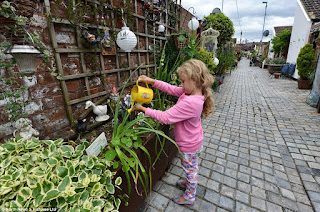A number of readers ask how to build a functioning community like ours here in South Terrace.
The honest answer is that it is not possible to build a community unless others want it, and someone acceptable to the majority of residents comes forward willing to spend time to manage and nurture it.
Given the first two factors, here is my personal recipe for community building. Bear in mind that all communities will be different - having different needs and objectives - so any plan needs to be flexible and responsive.
STEP 1
'Be clear as to the community you want to build'
A big mistake is to be too ambitious about community building. Start small. The process has to be 'bottom up' rather than 'top down'. This means that you will need to seek out those within your community who have similar aspirations and talk things through together.
We in South Terrace were initially brought together by development at the adjacent supermarket. The shared concerns effectively determined the nature and size of our community. We styled ourselves as the 'South Terrace Residents Group' and confined membership to the 24 houses and 8 cottages in the terrace.
This transpired to be a wise move. It ensured sufficient numbers - with sufficient shared objectives. If a group is expanded to include people with different and possibly conflicting interests, your group will be doomed.
STEP 2
'Ensure that membership is simple, easy and undemanding'
A common mistake when building a community is to imagine that others may have the same enthusiasm or commitment as you. I regularly hear of organisers 'handing out tasks' and having expectations. This is fatal. Those that want a higher level of involvement will come forward, but most community members simply want others to take the strain.
Here in South Terrace, we said, "You are automatically a member, unless you say no". Nobody objected. Each prospective member received an information sheet through their door, explaining the purpose of the group and requesting their name, email address and telephone contact number.
Over the next three weeks, slips were returned and we were able to build our confidential data base, including every household on the terrace.
STEP 3
'Give members an immediate sense of belonging'
We accompanied formation with membership of Neighbourhood Watch, Darlington. This offered a number of advantages. First, this was something that most residents trusted, and from which they perceived an immediate security benefit. Second, membership was reinforced by the 'gift pack' from NHW - with marker pens, stickers, note book and police contact numbers. Additionally, the early appearance of our Neighbourhood Watch lamp post notices gave an immediate sense of benefit.
STEP 4
'Keep members updated and informed'
Most groups start well, but decay over time. Residents move away or die and incomers are not informed and recruited. Of those that stay, some lose the sense of belonging due to inactivity.
It turned out to be pivotal in creating a sense of community. Members regularly visited the page, posted and 'liked' the variety of postings - including security information from Darlington Police, local events and happenings, members' birthdays and terrace news. Our group combines information sharing with 'news sheet' content, and this is well received. On settings, it is a closed group - to give members more privacy, and of course, we moderate every posting to avoid conflict. If you get it right, members will use the Facebook group to send messages and share thoughts.
Second, we have a Messenger group for instant messaging. Some groups prefer 'WhatsApp', but our residents chose this platform, probably as we were all existing Facebook users by way of social media. This way we can instantly seek support and assistance and share information and news.
Third, we used this blog - for those that did not have or want a Facebook account, and for outreach beyond the closed social media group. The blog has been successful in providing a platform for more in-depth review, comment and analysis.
Fourth, is Twitter. As a community, we don't have a Twitter account, but as group manager I occasionally tweet key concerns to a wider audience.
STEP 5
'Protect your data'
Every group organiser becomes a data user by virtue of the fact that they have personal data relating to members, e.g. names, addresses, telephone numbers and email addresses. It happens that I can encrypt and protect this information, but for others, simple steps are necessary.
First, ensure that any group emails sent to members are sent to your primary email address, and that all other recipients are added as 'Bcc' - blind copy. This avoids email addresses being visible amongst the group.
Second, only send emails that are necessary. People hate getting unsolicited emails in their in-box. Over a period of one year, I may email at most twice - and sometimes not at all. The simple rule is 'only email if no other option is available'.
Third, ensure that the privacy settings for your Facebook group are sufficient to protect your members. Set up your group as a 'closed group' - meaning that only members of it can see the postings. Permit members to post to the group page, but require admin approval for postings. These options are all available under the 'Edit Group Settings' button.
Fourth,
Always ask permission before revealing the identity of a member of your group.
STEP 6
'Keep your group topical'
There is nothing worse than discovering that the last shared event, news story or security information was a month or more ago. If nothing is happening locally, find something of interest.
Our recent postings include links to 'FixMyStreet', Darlovelo, Making Darlington Safer, The Back Lanes of Darlington, Financial Conduct Authority, and the Barker & Stonehouse Crossing.
Additionally, we will include local news items, such as members' birthdays, births, marriages and deaths, departures and arrivals, lost animals and details of town events if relevant.
STEP 7
'Chose your assistants'
If you go to the trouble of setting up a community group, don't allow it to become a 'free for all'. If you are a sensible organiser who is popular locally, your community will adhere, simply because you have taken this initiative. In such circumstances, it is unwise to allow the group to be diverted by division. Set your brief, your mandate, manage your group and moderate any contributions according to your ethos. It is wise to have other members as moderators - especially for social media groups - but ensure that you select them and that you manage the page to avoid anything too controversial appearing there.
STEP 8
Remember - communities are not virtual - they have to be real
We organise a handful of events throughout the year. They may be simple like 'The Best Garden' competition - judged on photographs; more substantial such as a litter-pick or lane clearing; or ambitious such as a street party. I find that it is the parents of children who are most likely to contribute here. After all, communities are underpinned by families, and the best legacy we can offer is a sense of community inclusion to children and young people. So, in picking events - think of what will interest the families in your street, and play to this strength.













































